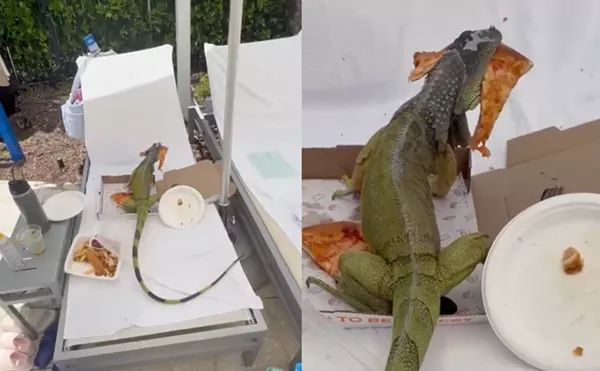"The ultimate goal is to be on shelves," Eric Guerrero says over a pair of roaring gas-fired burners that are jury-rigged with heat reflectors and firing up two 15-gallon kegs retrofitted with spigots and thermometers. He describes his beer-brewing setup as "Ghetto 101."
The Navy veteran stands over six feet tall, in a black and yellow T-shirt that reads "Angry Union" — the brand of the beer he makes with two firefighter buddies. They're one of several ambitious homebrewing teams in South Florida looking to grow their hobby into a business.
When they shared early batches of homebrew with friends, "everyone said, 'This is good. This is better than what I just bought at the store,' " Guerrero explains. "We had passion, and with passion, you can do anything."
As Guerrero brews, his eyes bounce from a computer printout to his iPhone, which is loaded with nearly a dozen homebrewing apps. Like most homebrewers, Guerrero learned how to make beer with help from online tutorials and YouTube videos.
Basic brewing is a simple enough process that long-extinct civilizations in Egypt and ancient Sumeria were able to do it. A source of starch — beer makers use anything from malted barley to rice husks — is steeped in hot water to extract the sugars. The liquid is strained and poured over yeast, which eat the sugar and produce alcohol as waste. That's what gets you drunk — microscopic yeast poop.
But to make beer that's tasty, with just the right amount of alcohol, is a true craft. Besides hangovers, homebrewing offers a science and math education far better than most schools. It demands extensive calculations and offers endless ways to screw up. Every variety of beer requires its grains to be steeped at a certain temperature for a certain length of time. Brewers keep track of their beer's starting and ending gravity and compare the two to calculate its final alcohol content. Small errors, like not cleaning the brewing equipment thoroughly with boiled water, can result in infections that ruin a batch. Most homebrewers boast about the hours they spend studying.
Computer programs have democratized beer-making, making fast work of complex calculations that once had to be done by hand. With just a touch, Guerrero can figure out how long he needs to steep, or "mash," the grain in hot water (about an hour) to create an American pale ale (an earthy, hoppy brew that's a touch less bitter than the more common India pale ale), plus how long it needs to ferment (two days) and its alcohol content. Guerrero calls this batch Charlie Echo and knows its alcohol content will be somewhere between 6 and 7 percent.
This technique is called all-grain brewing, and South Florida homebrewers spend $300 to $10,000 setting up their systems. However, a hobbyist homebrewer can make beer on a stovetop — this type is called "extract brewing" and starts with liquid that's already been steeped and strained — for as little as $65 using kits sold online.
By midmorning, both garage doors on Guerrero's beige-yellow stucco house in Cooper City are up, revealing a three-car space filled with refrigerators. After his kegs have boiled long enough, Guerrero opens the spigots and empties them, transferring the mix to six-gallon glass jugs called carboys, which he sticks in the fridge to ferment over gloppy beige yeast. Later he'll siphon the alcohol-laden liquid out of the jugs, keg it, and carbonate it. Ta-da! Beer.
Guerrero's finished batches are chilling in yet another refrigerator. He pours one he calls Belgian Brewdog into a glass goblet. The earthy grains are easy to taste, as are the bitter, piney hops and the slight sting from the brew's 12 percent alcohol. In brown bottles in another fridge sits pumpkin ale left over from the holidays. Each sip starts with a punch of cinnamon and allspice.
At BX Beer Depot in Lake Worth, graduated cylinders, valves, and rubber tubing hang from aged-looking pegboard. Owner Sally Parsons says when she bought the store in 2002, it was a drive-through pickup for kegs of Budweiser. Today, the keg business is all but dead. Parsons now specializes in selling hard-to-find craft beers and homebrewing supplies. Though Florida was slow to catch the craze, beer snobs, even here, are now demanding the best ingredients and artisan beermakers. It's the trendy local food movement — with 9 percent alcohol. Four years ago, brewing classes brought in five to 15 people. Today, 25 to 30 show up.
For those who want to go pro, though, the road to a commercial operation is long, winding, and expensive.
Dylan Block, who with his brother runs Blockhead Brewery, says he caught the beer bug about four years ago. He — and many others — were inspired by the Funky Buddha brewery and tap room, which opened in Boca Raton and will soon move into a new, much larger facility in Oakland Park. "Funky Buddha [Brewery] really opened the floodgate," Block says.
Block works at his family's textile distribution company in Miami's Wynwood Arts District. As a side project, he and his brother boil and ferment brews like White Thai affair, a Belgian white with Thai basil, spearmint, tangerine, and Indian coriander. The brothers brew 15 gallons at a time at their Cooper City home using a setup Dylan describes as "ghetto," even though he's spent nearly $10,000 on equipment. They have to brew several times a week to have enough beer for the festivals where they give away beer to fans who might later become customers. Homebrewers can't sell beer without a license, but they can pour free beer at festivals to promote a brand.
"The goal [for the beer] right now is to develop a following," he says. He hopes to find an investor and one day open a brewpub featuring his beers.
"You've got to know that starting out, you're not going to be making a profit right off the bat," says another homebrewer, A.J. Guerra, who worked at Pyramid Breweries in Seattle and now brews with a pal under the moniker 2 Live Brews at Guerra's home in Davie. They too hope to one day sell their beer at the retail level. "You really need to get your name out there and develop your base, then find the right people to partner with and get the financial backing."
Guerra is a server and manager at a Dania Beach Quarterdeck by day and makes about 15 gallons of beer monthly with his $1,200 system. Specialties include a dry whiskey porter called Old 84 and a brown ale with Hennessy called Doo Doo Brown.
Even if brewers were to get hold of one of the limited number of licenses and money to set up a brewery — Guerrero estimated it to be $500,000 — they still can't sell directly to retailers. Florida's three-tiered system, created in the days following the repeal of Prohibition, requires brewers to sell to distributors, who in turn sell to restaurants, hotels, and bars. The beer distribution industry across the country has lobbied hard to keep the middleman system in place. Washington state is the only place where retailers can buy directly from suppliers.
Moreover, Florida earlier this year rebuffed opportunities to support small brewers. Lawmakers were considering a bill backed by the Florida Brewers Guild to allow small breweries to sell 64-ounce "growlers." The measure failed under pressure from lobbyists for the Florida Beer Wholesalers Association, which represents Anheuser-Busch distributors.
That leaves only two ways up for the aspiring homebrewer. The first is to open a brewpub, which allows brewers to make beer onsite and sell it — but they must have a license, and they must also serve food. The Funky Buddha, along with Big Bear Brewing Co. in Coral Springs and Organic Brewery in Hollywood Beach, are brewpubs.
The second option is to make beer at a brewery and partner with a distributor who would sell the beer to retailers. Due South Brewery in Boynton Beach operates in this manner. Guerrero says he's explored the idea of renting a brewery and having his recipe produced there, then distributed, but the cost "could be as high as $40,000" to make 2,480 cases. Florida Brewing Co. in Melbourne offers such a service.
But corporate beverage conglomerates won't get these guys down; they pride themselves on being the underdogs.
Back at Sally Parson's BX Beer Depot, Parsons admits she's happy to see the audience for craft beer growing but says big retailers like supermarket chains only buy goods in massive quantities and will never be able to source the rare, small-batch beers she can get.
"One day, a guy who worked here came into the store and brought a bottle of Seadog Blueberry Wheat," she says. From that moment on, the mantra became "If you can buy it at Publix, I don't sell it here."










